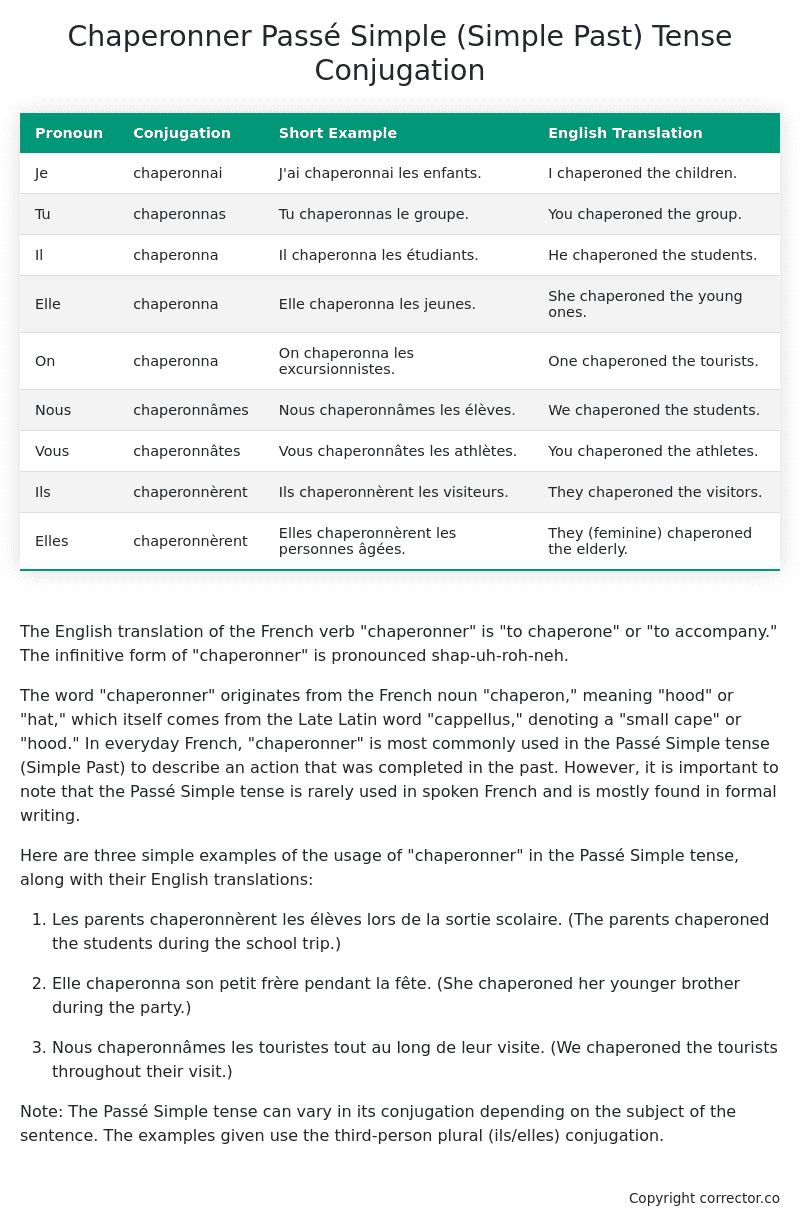Passé Simple (Simple Past) Tense Conjugation of the French Verb chaperonner
Introduction to the verb chaperonner
The English translation of the French verb “chaperonner” is “to chaperone” or “to accompany.” The infinitive form of “chaperonner” is pronounced shap-uh-roh-neh.
The word “chaperonner” originates from the French noun “chaperon,” meaning “hood” or “hat,” which itself comes from the Late Latin word “cappellus,” denoting a “small cape” or “hood.” In everyday French, “chaperonner” is most commonly used in the Passé Simple tense (Simple Past) to describe an action that was completed in the past. However, it is important to note that the Passé Simple tense is rarely used in spoken French and is mostly found in formal writing.
Here are three simple examples of the usage of “chaperonner” in the Passé Simple tense, along with their English translations:
-
Les parents chaperonnèrent les élèves lors de la sortie scolaire.
(The parents chaperoned the students during the school trip.) -
Elle chaperonna son petit frère pendant la fête.
(She chaperoned her younger brother during the party.) -
Nous chaperonnâmes les touristes tout au long de leur visite.
(We chaperoned the tourists throughout their visit.)
Note: The Passé Simple tense can vary in its conjugation depending on the subject of the sentence. The examples given use the third-person plural (ils/elles) conjugation.
Table of the Passé Simple (Simple Past) Tense Conjugation of chaperonner
| Pronoun | Conjugation | Short Example | English Translation |
|---|---|---|---|
| Je | chaperonnai | J’ai chaperonnai les enfants. | I chaperoned the children. |
| Tu | chaperonnas | Tu chaperonnas le groupe. | You chaperoned the group. |
| Il | chaperonna | Il chaperonna les étudiants. | He chaperoned the students. |
| Elle | chaperonna | Elle chaperonna les jeunes. | She chaperoned the young ones. |
| On | chaperonna | On chaperonna les excursionnistes. | One chaperoned the tourists. |
| Nous | chaperonnâmes | Nous chaperonnâmes les élèves. | We chaperoned the students. |
| Vous | chaperonnâtes | Vous chaperonnâtes les athlètes. | You chaperoned the athletes. |
| Ils | chaperonnèrent | Ils chaperonnèrent les visiteurs. | They chaperoned the visitors. |
| Elles | chaperonnèrent | Elles chaperonnèrent les personnes âgées. | They (feminine) chaperoned the elderly. |
Other Conjugations for Chaperonner.
Le Present (Present Tense) Conjugation of the French Verb chaperonner
Imparfait (Imperfect) Tense Conjugation of the French Verb chaperonner
Passé Simple (Simple Past) Tense Conjugation of the French Verb chaperonner (You’re reading it right now!)
Passé Composé (Present Perfect) Tense Conjugation of the French Verb chaperonner
Futur Simple (Simple Future) Tense Conjugation of the French Verb chaperonner
Futur Proche (Near Future) Tense Conjugation of the French Verb chaperonner
Plus-que-parfait (Pluperfect) Tense Conjugation of the French Verb chaperonner
Passé Antérieur (Past Anterior) Tense Conjugation of the French Verb chaperonner
Futur Antérieur (Future Anterior) Tense Conjugation of the French Verb chaperonner
Subjonctif Présent (Subjunctive Present) Tense Conjugation of the French Verb chaperonner
Subjonctif Passé (Subjunctive Past) Tense Conjugation of the French Verb chaperonner
Subjonctif Imparfait (Subjunctive Imperfect) Tense Conjugation of the French Verb chaperonner
Conditionnel Présent (Conditional Present) Tense Conjugation of the French Verb chaperonner
Conditionnel Passé (Conditional Past) Tense Conjugation of the French Verb chaperonner
Conditionnel Passé II (Conditional Past II) Tense Conjugation of the French Verb chaperonner
L’impératif Présent (Imperative Present) Tense Conjugation of the French Verb chaperonner
L’impératif Passé (Imperative Past) Tense Conjugation of the French Verb chaperonner
L’infinitif Présent (Infinitive Present) Tense Conjugation of the French Verb chaperonner
L’infinitif Passé (Infinitive Past) Tense Conjugation of the French Verb chaperonner
Le Participe Présent (Present Participle) Tense Conjugation of the French Verb chaperonner
Le Participe Passé (Past Participle) Tense Conjugation of the French Verb chaperonner
Struggling with French verbs or the language in general? Why not use our free French Grammar Checker – no registration required!
Get a FREE Download Study Sheet of this Conjugation 🔥
Simply right click the image below, click “save image” and get your free reference for the chaperonner Passé Simple tense conjugation!

Chaperonner – About the French Passé Simple (Simple Past) Tense
Formation
Usage
Narration
Historical Context
Interactions with other tenses
Passé Composé
Imparfait
Conditional and Subjunctive
Summary
I hope you enjoyed this article on the verb chaperonner. Still in a learning mood? Check out another TOTALLY random French verb conjugation!


